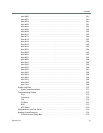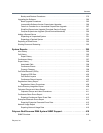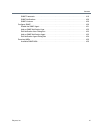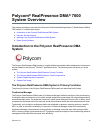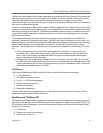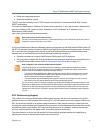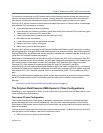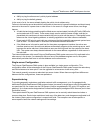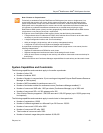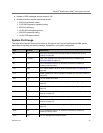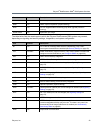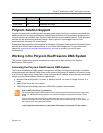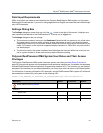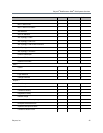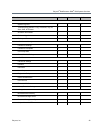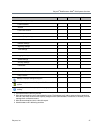
Polycom
®
RealPresence DMA
®
7000 System Overview
Polycom, Inc. 20
System Capabilities and Constraints
The following capabilities and constraints apply to the entire supercluster:
● Number of sites: 500
● Number of subnets: 5000
● Number of clusters in a supercluster: 5 (not counting an integrated Polycom RealPresence Resource
Manager or CMA system)
● Number of MCUs enabled for conference rooms: 64
● Number of territories enabled for conference rooms (Conference Manager enabled): 3
● Number of concurrent VMR calls: 1200 per cluster (Conference Manager), up to 3600 total
● Number of concurrent SIP<->H.323 gateway calls: 500
● Size of Active Directory supported: 1,000,000 users and 1,000,000 groups (up to 10,000 groups may
be imported)
The following capabilities and constraints apply to each cluster in the supercluster:
● Number of registrations: 15000
● Number of contacts registered to a Microsoft Lync 2013 server: 25,000
● Number of concurrent H.323 calls: 5000
● Number of concurrent SIP calls: 5000
● Total number of concurrent calls: 5000
● Number of network usage data points retained: 8,000,000
Note: Clusters vs. Superclusters
Technically, a standalone Polycom RealPresence DMA system (two-server or single-server) is a
supercluster that contains one cluster. All the system configuration and other data that’s shared
across a supercluster is kept in the same data store. At any time, another Polycom RealPresence
DMA system can be integrated with it to create a two-cluster supercluster that shares its data store.
It’s important to understand the difference between two co-located servers forming a single
RealPresence DMA system (cluster) and two geographically distributed RealPresence DMA clusters
(single-server or two-server) joined into a supercluster.
A single two-server RealPresence DMA system (cluster) has the following characteristics:
• A single shared virtual IP address and FQDN, which switches from one server to the other when
necessary to provide local redundancy and fault tolerance.
• A single management interface and set of local settings.
• Ability to manage a single territory, with no territory management backup.
• A single set of Call Server and Conference Manager responsibilities.
A supercluster consisting of two RealPresence DMA clusters (single-server or two-server) has the
following characteristics:
• Separate IP addresses and FQDNs for each cluster.
• Separate management interfaces and sets of local settings for each cluster.
• Ability for each cluster to manage its own territory, with another cluster able to serve as backup for
that territory.
Different Call Server and Conference Manager responsibilities for each territory and thus each cluster.



